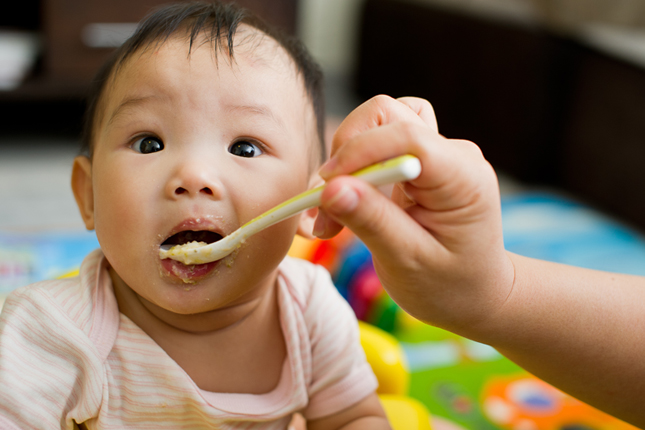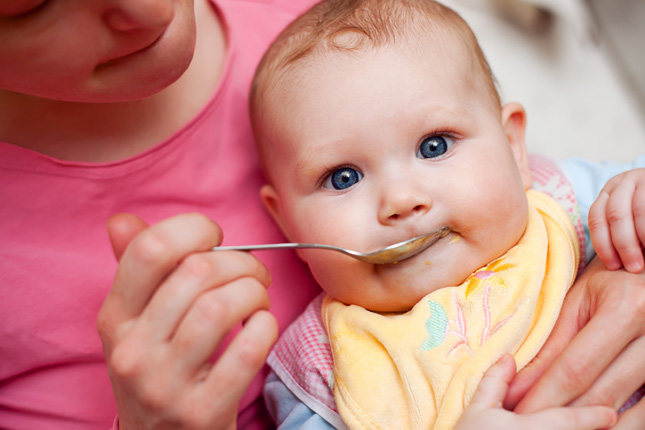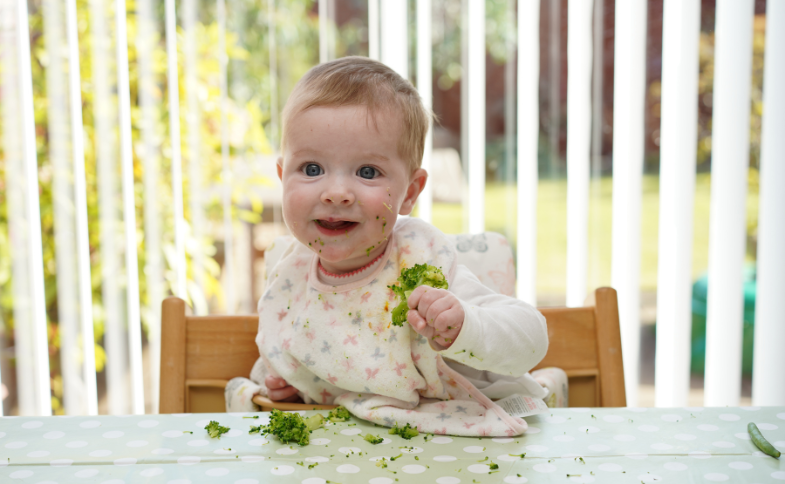Introducing Your Baby to Solid Foods
If you are reading this, you probably have an adorable little one who’s ready to start solids. Congratulations! This is a massive milestone and you should be super proud of yourself (and your little one!).
Starting solids is a sign that your kiddo is growing and developing. It’s also a lot of fun! However, it can be a bit overwhelming sometimes, especially if you're not sure where to start. That’s why we have prepared this guide to help walk you through the process of introducing solid foods to your baby, from choosing the right foods to feeding them safely.
Are you ready? Let’s get started!

When to Start
The American Academy of Pediatrics (AAP) recommends that you start introducing solid foods to your baby when they are around 6 months old. However, every baby is different, so if you are in doubt, look for these signs that your baby is ready:
- They can sit up with support.
- They have good head and neck control.
- They show an interest in food or watching you eat
- They open their mouth when you put food near them.
- Loss of tongue thrust reflex: Your baby can move food from the front to the back of their tongue and swallow it without pushing it out with their tongue.
Don't rush into solids too soon if your baby isn't showing these signs yet. Their digestive system needs time to mature. If you're not sure whether or not your baby is ready, talk to your doctor.
Choosing the Right Foods
When you're first starting out, it's important to choose soft, easy-to-swallow foods. The grocery store baby food aisle can be overwhelming, but remember, you can start simple. Single-ingredient purees like mashed bananas or sweet potatoes are excellent first foods. They're easy on tiny tummies and allow your baby to experience different flavors without overwhelming their taste buds.
Here are some good choices for first foods:
- Iron-fortified baby cereal mixed with breastmilk or formula
- Pureed vegetables and fruits
- Soft mashed foods like avocado, banana, or mashed potatoes
- Oatmeal
- Yogurt
- Cooked meats
Start with single-ingredient foods to watch for any allergic reactions. Try offering solids after a milk feeding when your baby is calm and curious.
Avoid giving your baby honey, cow's milk, and hot dogs. Honey can contain botulism spores, which can be dangerous for babies. Cow's milk is not a good source of nutrition for babies and can actually cause them to become constipated. Finally, hot dogs are a choking hazard.
To prepare pureed foods for your baby, you can use a blender, food processor, or hand-held masher to mash the cooked food until it is smooth and thin. Add some breast milk, formula, or water to adjust the consistency. You can also buy ready-made baby food from the store, but make sure to check the ingredients list and avoid foods that contain added sugar or artificial flavors.

How to Feed Your Baby
Feeding your little one is pretty straightforward. Start by offering a small amount of food, about a teaspoonful at a time. Let them explore the food with their hands and mouth. Don't be discouraged if your little one does not eat much at first. This is a completely new skill your kiddo is learning, so it’s going to take some time.
As you feed your little one, keep these tips in mind:
- Go slow – Introduce one new food at a time, waiting 3-5 days before trying another.
- Make it fun – Use different colored bowls and spoons. Food is a sensory experience for babies!
- Aim for consistency – Offer solids 1-2 times per day, working up to 3 times per day by 7-8 months.
- Use a small, soft-tipped spoon to feed your baby, and avoid using a bottle, cup, or syringe to give solid foods. This will help your baby learn how to use their mouth and tongue to eat and prevent choking or overfeeding.
As your baby gets older, you can gradually increase the amount of food you offer and start to offer them finger foods. Above all else, always supervise your baby when they're eating, and never leave them alone with food.
Introducing finger foods and allergenic foods
Just like any other skill, both you and your baby will get better at this over time. By around 8 to 10 months, your little one might be ready to experiment with finger foods. Soft, bite-sized pieces of fruits, vegetables, and well-cooked pasta are perfect for tiny fingers. Not only does this foster independence, but it's also a sensory experience that helps develop their fine motor skills. Finger foods also encourage your baby to feed themselves and become more independent.
When offering finger foods to your baby, make sure to cut them into small, bite-sized pieces that are easy to grasp and swallow. Avoid foods that are hard, sticky, or round. Stay away from nuts, seeds, popcorn, raisins, grapes, hot dogs, or candy. These foods are choking hazards and should never be offered to babies.
As you introduce new foods, keep an eye out for any allergic reactions. Start with one new food at a time and wait a few days before introducing another. Common allergens like peanuts, eggs, and dairy can be introduced after other solids are well-received.
The AAP advises parents to introduce potentially allergenic foods to their babies when they are 4 to 6 months old, along with other foods, and continue to offer them frequently and consistently. There is no need to delay or avoid these foods unless your baby has a history of severe eczema or egg allergy, in which case you should consult your pediatrician.
If your baby tolerates a food well, you can keep giving it to them as part of their regular diet. If you notice any signs of an allergic reaction (rashes, hives, swelling, vomiting, diarrhea, or difficulty breathing), stop giving that food and seek medical attention right away.
At the end of the day, every baby is unique. There's no one-size-fits-all approach to introducing solids. Trust your instincts and pay attention to your baby's cues. If they're eagerly opening their mouth for more, it's a good sign. If they turn away or seem disinterested, give them some time and try again later.

Safety Tips
Here are a few safety tips to remember when introducing solid foods to your baby:
- Make sure the food is soft and easy to swallow.
- Cut food into small pieces, and avoid giving your baby whole grapes or hot dogs.
- Cook food thoroughly.
- Avoid honey and cow's milk – Due to health concerns, wait until 1 year old for these.
- Wash your hands before handling food.
- Clean your baby's high chair after each meal.
- Supervise your baby closely every time they eat
By following these tips, you can help make the process of introducing solid foods to your baby a safe and enjoyable experience.
Final Thoughts
Introducing solid foods to your baby is a big milestone, but it's also a lot of fun! It's such a special time watching their little personalities emerge as they discover new tastes and textures. By following these tips, you can help make the process as smooth as possible. Cherish these early feeding experiences, celebrate the milestones, and savor the delightful mess that comes with each new bite. Before you know it, your little one will be eating regular food like a pro! So just trust your instincts, go at your baby's pace, and enjoy the journey! You’ve got this!